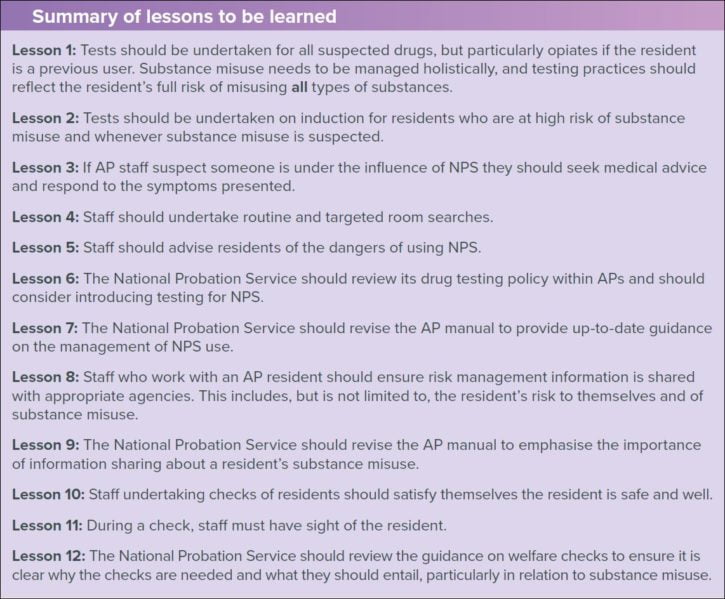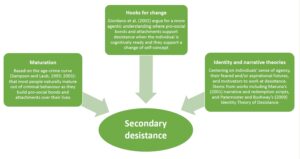Approved premises and substance misuse
Approved Premise (APs, more commonly known as probation hostels), home to people released from prison or on bail or court orders, need more effective drug testing practices and better staff guidance to identify and address the risks associated with substance misuse, and support individuals.
This is the official summary of a new (14 November 2017) report by the Prisons and Probation Ombudsman (PPO). Overdoses of opiate and other drugs, including alcohol, by people released from prison remain a significant risk, the PPO ‘Learning Lessons’ bulletin found. People are at a higher risk of overdose if they slip back into drug and alcohol use after periods of abstinence or detoxification.
Overdoses and NPS
The bulletin – Approved Premises – substance misuse – based on findings from deaths in APs investigated by the PPO also raised significant concerns about New Psychoactive Substances (NPS). These range from stimulants to hallucinogens and are commonly seen in prisons and the community as synthetic cannabinoids, known by names such as Spice and Mamba.
Elizabeth Moody, the acting Ombudsman, said:
The rise of New Psychoactive Substance use in the prison estate is well documented and is widely recognised, in the words of the previous Ombudsman, as a “gamechanger”. However, it is clear from our investigations that the implications of NPS for the AP estate have not yet been fully understood or addressed by the National Probation Service (which is responsible for APs).
29 deaths
The PPO investigated 46 deaths in APs in the last five years (September 2012 to August 2017). Of these, 29 completed investigations were into cases where the deaths were drug-related, or where there was a history of substance misuse.
The bulletin expressed concern that testing for NPS in APs “appears to lag behind that in prisons and does not draw on the experience of prisons”.
Five case studies are included in the bulletin. In two of these cases, residents were found to have overdoses on hostel premises. This raises a real issue for the HMPPS, NPS and hostel managers and staff. If these two individuals had been in a police station, they would (almost certainly) have been checked on a sufficiently regular basis for their deaths to have been prevented.
The Ombudsman acknowledges staff cannot monitor residents at all times and that excessive or intrusive checks may not be helpful for
building residents’ independence or for fostering positive relationships with staff.
Nonetheless, checks are important to ensure residents’ safety and wellbeing, and it may be that hostels need to find a different balance to this dilemma particularly for the sizable proportion of hostel residents who have a history of dependent drug and/or alcohol use often exacerbated by mental health issues.
Recommendations
Some of the PPO investigations identified deficiencies in information sharing and in welfare checks. The bulletin made a number of recommendations relating to:
- Ensuring a good flow of information between stakeholders, which is critical, particularly for managing substance misuse where there is a clear requirement for effective multi-disciplinary working. PPO investigations found this did not always happen.
- Checks on the welfare of AP residents – another important way to ensure the risks associated with substance abuse are well managed. PPO investigations found checks were not always carried out effectively.
- An overarching need for the National Probation Service to improve the AP manual to give staff better guidance on NPS use, information sharing and making welfare checks.
The bulletin summarises 12 key learning points shown below:

The acting Ombudsman, Elizabeth Moody, concluded:
We know offenders can be at heightened risk of death following their release into the community. I hope this bulletin will help AP staff apply the learning from our investigations to improve the ways they identify, monitor and address the risk factors associated with substance misuse.









3 Responses
Who authorised the use of the photographes at the being of this article?
Two of the photographes are of Adelaide House an Independant Approved Premises (IAP) not an NPS Approved Premise.
The Trustees of this charity take objection to the photographes of our premises being featured in this article and we have had No Deaths on our premises in over 20 yrs drug related or otherwise.
We will be persuing legal advise on this matter.
Apologies. Merely a collage of hostel images via Google. No implications meant. Image had been changed.
Whilst recognising that there is drug use among hostel residents, the desire to combat the effects of drug use needs to be balanced against the rights of the individual.
Current systems appear to have created a climate whereby hostel staff feel obliged to test residents more frequently than could possibly be legally justifiable.
There are a number of probation instructions which provide guidance to this end. The question is whether or not staff are aware of the legal parameters.
I don’t believe that all of those staff who should know, do know. This is worrying as it clearly shows the potential for abuse to be quite wide spread.
Your views are welcomed.